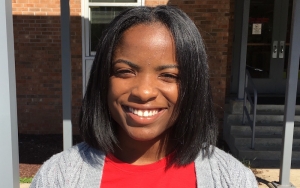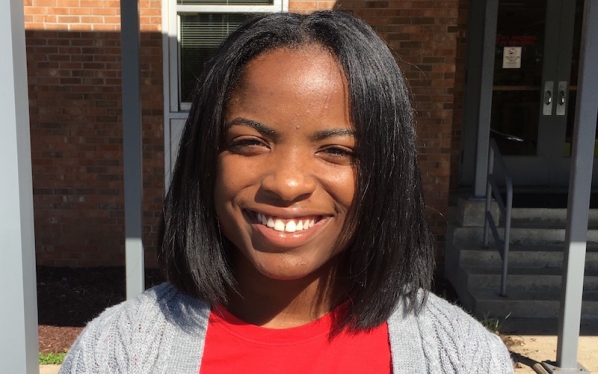Deziree Baker ('18) found her inspiration to teach thanks to a psychology professor at Johnston Community College, whose approach to teaching made her want to become an educator one day. "She made learning a journey," Deziree recalls, "as opposed to something that can be achieved in one lesson." From that point forward, she decided to embody her professor's approachable style of teaching and pursue a career in education. "I think it is important to make your students feel comfortable enough to come to you ... but it is also okay to establish an environment in which we all learn together." This focus on shared learning informed her approach to student teaching at North Johnston High School during the fall of 2018, and will continue to influence her decisions as she starts a career in social studies education.
She has always been a history lover too. Although Deziree was initially intimidated by the idea of teaching it, she has enjoyed the learning process. "Every lesson is an opportunity to form and answer new questions." She enjoys the idea of solving mysteries in history, an approach to learning and historical inquiry she learned in history education courses.
Deziree taught 9-12 social studies in Wake County Schools (Raleigh, NC) for several years, while also pursuing a Master's degree in Urban Education, and middle grades at Charlotte-Mecklenberg Schools. She is currently a doctoral student in the Curriculum and Instruction Program – Urban Education strand - at the University of North Carolina at Charlotte.
Why did you choose App State?
Deziree Baker: I chose App State for a variety of reasons. Appalachian State is a great education school. Every class that I have taken that is specific to pedagogy, and teaching strategies in the classroom, has been super helpful to me, especially during my semester of student teaching. I originally came to Boone as an elementary education major. When researching different schools for this major, App State made the cut on multiple different lists. However, Appalachian is stellar in history classes as well, as I have been able to grow stronger in my content knowledge by taking the history department's classes. I also chose App because of its location; I wanted a complete change of scenery and I got it. I was truly able to work on my last two years of school in a peaceful environment, and I was also able to grow in terms of my worldview, as I was exposed to a diverse set of beliefs and opinions.
How has the History Education Program prepared you for a career in history/social studies education?
DB: The History Education Program has prepared me in multiple ways. First, the content classes have been great in providing the content knowledge necessary to teach. I was very skeptical once I started student teaching, concerned with thoughts like: "Am I really going to remember all of this content?" And I have, largely because I genuinely learned about the past and did not simply memorize facts. The pedagogy classes have equally prepared me as an educator. HIS 3626 -Introduction to Secondary History Education (ISHE) - provided content specific skills and tips necessary for success in the social studies classroom. We learned the importance of lesson planning, as well as the intentional process of creating a curriculum. In that class, we also discussed methods of delivering and understanding content in our classrooms as well. The Methods Course - CI 3100 Teaching High School Social Studies - was also pertinent in shaping our own personal pedagogy as educators. We discussed content specific strategies, but also general strategies as well. This class is aptly placed before student teaching, because it has truly been instrumental as a resource for me in my final semester. The concepts learned from this class are some that transcend beyond strictly social studies education, so no matter where I end up in terms of teaching, I can always apply these concepts as well.
How can App State do a better job of recruiting prospective history (education) majors?
DB: Simply by having more exposure. The counties that are closer to App tend to have higher numbers of representation, because school representatives are more prone to go to the schools and talk to prospective students. As a student that lives on the eastern side of the state, I was not able to learn about App State, nor its History Education Program first hand. I believe it would make a difference if there was more widespread recruiting across the state. For such a highly successful program, the History Department deserves to have more students come to App State specifically focused on working and improving as a future history/social studies educator.

